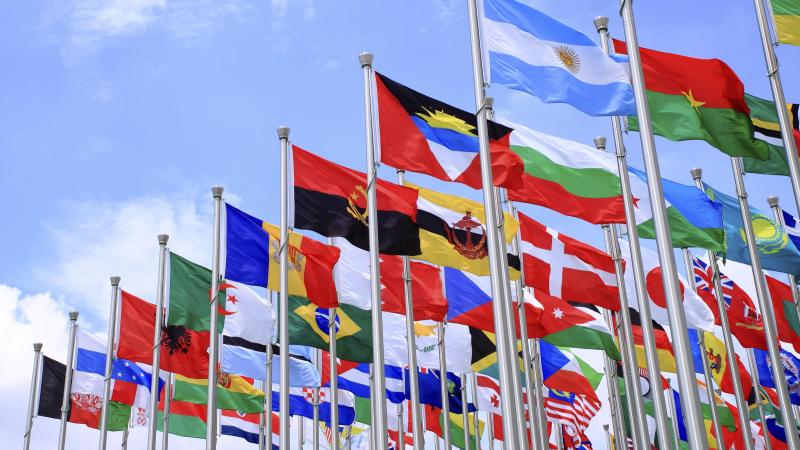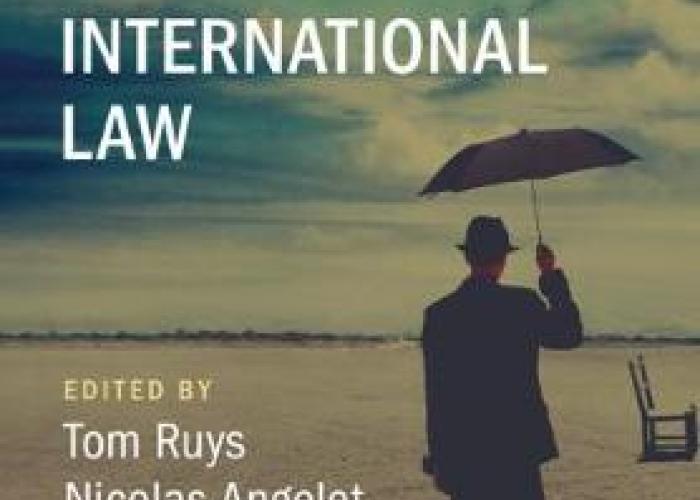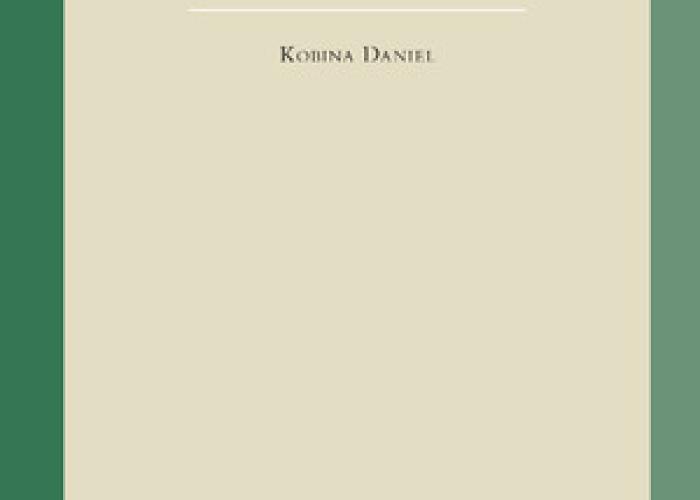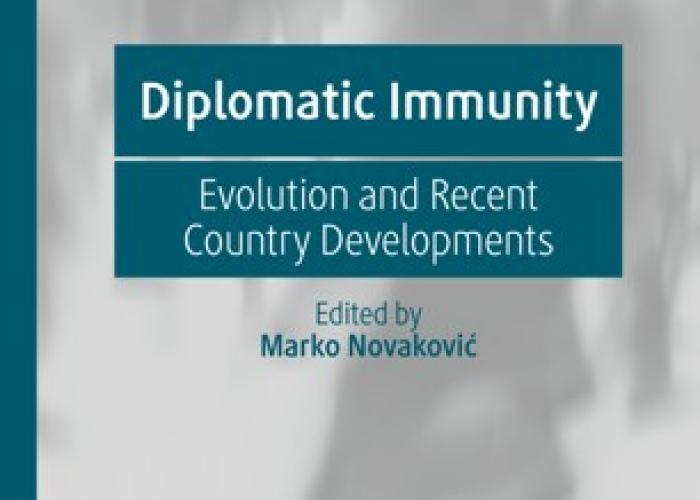Few topics of international law speak to the imagination as much as international immunities. Questions pertaining to immunity from jurisdiction or execution under international law surface on a frequent basis before national courts, including at the highest levels of the judicial branch and before international courts or tribunals.
The several regimes relevant to the immunities of the State itself, and of international organisations created by States, and of individuals acting under the authority of the State or of international organisations, are governed by multiple different bodies of international law, all of which are amenable in principle to analysis in terms of the classic enumeration of sources in Article 38(1) of the Statute of the International Court of Justice (ICJ).
The main treaties on immunities of international organisations took shape very shortly after the adoption of the UN Charter, which provides in Article 105(1): ‘The Organization shall enjoy in the territory of each of its Members such legal capacity as may be necessary for the exercise of its functions and the fulfillment of its purposes.’ Article 105(2) provides: ‘Representatives of the Members of the United Nations and officials of the Organization shall similarly enjoy such privileges and immunities as are necessary for the independent exercise of their functions in connection with the Organization.’
With regard to state immunities, the ICJ’s Jurisdictional Immunities case (ICJ 143) affirms a duty of States to afford immunities as a matter of international law, not merely as an act of grace, discretion or policy.
As far as diplomatic and consular immunities are concerned, reciprocity is a well- established feature of the international legal regimes. In Case Concerning United States Diplomatic and Consular Staff in Tehran (ICJ 64), the International Court of Justice took note of the ‘reciprocal obligations’ observed throughout history towards diplomatic envoys and embassies and pointed to the ‘self-contained regime’ for dealing with abusive conduct by persons enjoying immunities.
Individuals who personify a State or represent their State in diplomatic relations have been accorded personal inviolability within the receiving State and immunity from legal process for many centuries and across all civilisations. Legal analysis of immunities applicable to such individuals takes account of differing considerations for different categories of persons (for example, incumbent or former heads of State and government, high-level officials, diplomats, consuls, staff of missions, international civil servants and family members) in their diverse forms of activity (for example, official or commercial), and also different modes of potential liability (for example, criminal or civil). Given the multiplicity of factors, this analysis can be a complex exercise, involving the interplay of numerous domestic and international sources of law. Further complications arise by virtue of the fact that immunity is not automatic – in the modern era it needs to be claimed on behalf of the State or organisation under whose authority the individual acts, and it can also be waived.
This Research Guide is intended as a starting point for research on Immunities. It provides the basic legal materials available in the Peace Palace Library, both in print and electronic format. Handbooks, leading articles, bibliographies, periodicals, serial publications and documents of interest are presented in the Selective Bibliography section. Links to the PPL Catalogue are inserted. The Library's subject headings (keywords) xxx are instrumental for searching through the Catalogue. Special attention is given to our subscriptions on databases, e-journals, e-books and other electronic resources. Finally, this Research Guide features links to relevant websites and other online resources of particular interest.
Sources of international law
Treaties
- Convention on the Privileges and Immunities of the United Nations (New York, 13 February 1946)
- Convention on Privileges and Immunities of the Specialized Agencies (New York, 21 November 1947)
- European Convention on State Immunity 1972
- United Nations Convention on Jurisdictional Immunities of States and their property (New York, 2 December 2004)
- Vienna Convention on Diplomatic Relations (Vienna, 18 April 1961)
- Vienna Convention on Consular Relations (Vienna, 24 April 1963)
Case-law
-
ICJ 64: Case Concerning United States Diplomatic and Consular Staff in Tehran
-
ICJ 163: Immunities and Criminal Proceedings (Equatorial Guinea v. France)
- ICJ 143: Jurisdictional Immunities of the State (Germany v. Italy: Greece intervening)
Reference works
- O'Keefe, R., Christian J. Tams, C.J. and Tzanakopoulos, A. (eds.), The United Nations Convention on Jurisdictional Immunities of States and Their Property : A Commentary, Oxford, Oxford University Press , 2013.
- Reinisch, A. and Bachmayer, P. (eds.), The conventions on the privileges and immunities of the United Nations and its Specialized Agencies: A Commentary, Oxford, Oxford University Press , 2016.
- Ruys, T., Angelet, N. and Ferro, L. (eds.), The Cambridge Handbook of Immunities and International Law, Cambridge, Cambridge University Press, 2019.
Selected books and articles
- Bankas, E.K., The State Immunity Controversy in International Law: Private Suits against Sovereign States in Domestic Courts, Berlin, Springer, 2005.
- Banteka, N., "No Longer Immune?: How Network Theory Decodes Normative Shifts in Personal Immunity for Heads of State", Virginia Journal of International Law, 59 (2019), No. 2, pp. 395-448.
- Cartes Rodríguez, J.B., "Reflexiones en torno a la inmunidad de jurisdicción penal de los Jefes de Estados ante la comisión de crímenes internacionales en el marco del Estatuto de Roma = Reflections regarding the immunity of criminal jurisdiction of the Heads of States before the Commission of International Crimes in the framework of the Rome Statute", Anuario español de derecho internacional, 35 (2019), pp. 487-531.
- Damrosch, L.F., "The sources of immunity law - between international and domestic law", in Ruys, T., Angelet, N. and Ferro, L. (eds.), The Cambridge Handbook of Immunities and International Law, Cambridge, Cambridge University Press, 2019, pp. 40-60.
- Daniel, K.E., Head of State immunity under the Malabo Protocol: triumph of impunity over accountability? Leiden, Boston, Brill Nijhoff, 2021.
- Drake, E., "Sovereign Immunity for Russia's Rocket Engines? : Enforcing the "Yukos" Award", Brooklyn journal of international law, 45 (2019), No. 1, pp. 367-402.
- Ekori, A.H., "The ICC or the ACC: Defining the Future of the Immunities of African State Officials", African journal of international criminal justice, 6 (2020), No. 1, pp. 50-71.
- Foakes, J., The Position of Heads of State and Senior Officials in International Law,Oxford, Oxford University Press, 2014.
- Fox, H. and Webb, Ph., The Law of State Immunity, Oxford, Oxford University Press , 2013.
- Franchini, D., "State Immunity as a Tool of Foreign Policy: the Unanswered Question of Certain Iranian Assets", Virginia journal of international law, 60 (2020), No. 2, pp. 433-483.
- Hamuli Kabumba, Y., "La Convention de New York de 1958 et la renonciation à l'immunité de exécution de l'État en droit international", Annales de droit de Louvain: revue trimestrielle de droit belge, 78 (2018), No. 1, pp. 19-52.
- Huang, D. and Shan, Q., "The Immunity of Judge Akay of the MICT", Chinese journal of international law, 19 (2020), No. 1, p. 137-155.
- Jervis, C.E., "Jurisdictional Immunities Revisited: An Analysis of the Procedure Substance Distinction in International Law", European journal of international law, 30 (2019), No. 1, pp. 105-128.
- Kerr, C.-G., "Sovereign Immunity, the AU, and the ICC: Legitimacy Undermined", Michigan Journal of International Law, 41 (2020), No. 1, pp. 195-225.
- Kloth, M., Immunities and the Right of Access to Court under Article 6 of the European Convention on Human Rights, Leiden, Nijhoff, 2010. [e-book]
- La Manna, M., "Be Careful What You Wish For: The International Law Commission Recognizes a List of Instances in Which Functional Immunity Does Not Apply", La Comunità Internazionale: rivista trimestrale della Società Italiana per l'Organizzazione Internazionale, 73 (2018), No. 4, pp. 651-672.
- Lapas, D., "Diplomatic Privileges and Immunities for IGO-Like Entities: A Step Towards a New Diplomatic Law?", International Organizations Law Review, 17 (2020), No. 2, pp. 350-378.
- Novaković, M., Diplomatic Immunity: Evolution and Recent Country Developments, Cham, Palgrave McMillan, 2020.
- O'Keefe, R., "Jurisdictional Immunities", in Tams, C.J. and Sloan, J. (eds.), The Development of International Law by the International Court of Justice, Oxford [etc.], Oxford University Press, 2013, pp. 107-148.
- Okeke, E.C., Jurisdictional Immunities of States and International Organizations, New York, NY, Oxford University Press, 2019.
- Olásolo, H., Martínez Vargas, J.R. and Quijano Ortiz, L., "The Tension between State Duties to Investigate and Prosecute ius Cogens Crimes and Immunity of the Highest State Representatives from Foreign Criminal Jurisdiction", International Criminal Law Review, 20 (2020), No. 5, pp. 841-861.
- Orakhelashvili, A. (ed.), Research Handbook on Jurisdiction and Immunities in International Law, Cheltenham, Edward Elgar Publishing, 2015.
- Orakhelashvili, A., "Jurisdictional immunity of States and general international law - explaining the jus gestionis v. jus imperii divide", in Ruys, T., Angelet, N. and Ferro, L. (eds.), The Cambridge Handbook of Immunities and International Law, Cambridge, Cambridge University Press, 2019, pp. 105-124.
- Pedreti, R., Immunity of Heads of State and State Officials for International Crimes, Leiden, Boston, Brill Nijhoff, 2015.
- Peters, A., Lagrange, E., Oeter, S. and Tomuschat, C. (eds.), Immunities in the Age of Global Constitutionalism, Leiden, Boston, Brill Nijhoff, 2015. [e-book]
- Rossi, P., "The International Law Significance of "Jam v. IFC": Some Implications for the Immunity of International Organizations", Diritti umani e diritto internazionale, 13 (2019), No. 2, pp. 305-318.
- Shi, X., "Official Acts and Beyond: Towards an Accurate Interpretation of Diplomatic Immunity Ratione Materiae under the Vienna Convention on Diplomatic Relations", Chinese Journal of International Law, 18 (2019), No. 3, pp. 669-694.
- Steytler, I., "The unsettled question of Al-Bashir’s immunity: a case note on the ICC Minority Opinion of Judge Perrin de Brichambaut", South African Yearbook of International Law, 43 (2018), pag. 71-99.
- S̆turma, P., Chovancová, K., Šmigová, K. and Větrovský, J., Immunities of States and their Officials in Contemporary International Law, Passau, Berlin, Prague, RW&W Science & New Media, 2017.
- Subramanian, S., "Abuse of Diplomatic Privileges and the Balance between Immunities and the Duty to Respect the Local Laws and Regulations under the Vienna Conventions: The Recent Indian Experience", The Chinese journal of global governance, 3 (2017), No. 2, pp. 182-233.
- Treichl, C., "The Denial of Oral Hearings by International Administrative Tribunals as a Factor for Lifting Organizational Immunity before European Courts: A(nother) Critical View", International Organizations Law Review, 16 (2019), No. 2, pp. 407-446.
- Viterbo, A. and Spagnolo, A., "Of Immunity and Accountability of International Organizations: A Contextual Reading of "Jam v. IFC"", Diritti umani e diritto internazionale, 13 (2019), No. 2, pp. 319-330.
- Volpe, V., Peters, A. and Battini, S. (eds.), Remedies against immunity? : Reconciling international and domestic law after the Italian Constitutional Court's Sentenza 238/2014, Berlin, Springer, 2021.
- Wood, M., "Lessons from the ILC’s Work on ‘Immunity of State Officials’: Melland Schill Lecture, 21 November 2017", Max Planck Yearbook of United Nations law online, 22 (2019), pp. 34-69.
Periodicals, serial publications
Bibliographies
- "Bibliography", in: M. Kloth, Immunities and the Right of Access to Court under Article 6 of the European Convention on Human Rights, Leiden, Nijhoff, 2010, pp. 207-217.
- "Selected Bibliography", in: Foakes, J., The Position of Heads of State and Senior Officials in International Law,Oxford, Oxford University Press, 2014, p. 207.
- Database on “The immunities of States and international organisations” by the Committee of Legal Advisers on Public International Law (Council of Europe)
- Max Planck Encyclopedias of International Law
[PPL access] Immunities (subject) [Entries: 1053]
[PPL access] Peer-reviewed article Immunity, Diplomatic by Rosanne van Alebeek. Article last updated: May 2009.
[PPL access] Immunities (subject) [Entries: 523].
-
New perspectives on the immunity of international organisations by Alan Franklin (Diplo blog, 17 August 2018)



